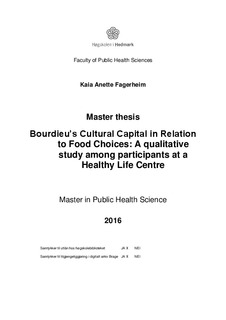Bourdieu’s Cultural Capital in Relation to Food Choices: A qualitative study among participants at a Healthy Life Centre
Master thesis
Permanent lenke
http://hdl.handle.net/11250/2424689Utgivelsesdato
2016Metadata
Vis full innførselSammendrag
Abstract: Aim: The aim of the study was to explore how incorporated cultural capital affect food choice among participants at a Healthy Life Centre, and explore the possibility to apply cultural capital theory to future public health promotion practice.
Method: A qualitative inquiry was conducted among participants at a Healthy Life Centre southeast in Norway. Data was collected by six in-depth interview, with a total of five men and one woman. A theory-driven thematic analysis was performed to look for similarities and differences across the data.
Findings and conclusion: Summarised, the findings of this study showed how cooking skills and health and nutritional knowledge (as constructs of incorporated cultural capital) affect food choices. Further, there was thought to be a relationship between the participants childhood experiences and their current food choices and overall lifestyle. These findings may contribute to explain the development and maintenance of differences in dietary intake. This in turn can explain the observed obesity gradient which is of importance when accounting for the social inequality in health. Implications: Findings from this study cannot be generalized, but it may contribute to a better understanding of what affect food choice among participants at a Healthy Life Centre, which in turn may have implications for future public health promotion practice.
Key words: Healthy Life Centre, food choice, social inequality, behaviour, cultural capital theory, public health promotion practice. Sammendrag: Formål: Målet med studien var å undersøke hvordan innkorporert kulturell kapital påvirker matvalg blant deltakerne på ‘Frisklivsentralen’, og utforske muligheten for å anvende kulturell kapital teori i fremtidig helsefremmende og forebyggende praksis.
Metode: En kvalitativ undersøkelse ble gjennomført blant deltakerne på en ‘Frisklivsentral’ sørøst i Norge. Data ble samlet inn ved seks dybdeintervju, med totalt fem menn og en kvinne. En teori-drevet tematisk analyse ble utført for å se etter likheter og forskjeller mellom dataene.
Resultater og konklusjon: Oppsummert kan disse funnene i denne studien viste hvordan matlagingsferdigheter og helse og ernæringsmessig kunnskap (som elementer av innlemmet kulturell kapital) påvirker matvalg. Videre ble det antatt å være en sammenheng mellom deltakerne barndomserfaringer og deres nåværende mat valg og generell livsstil. Disse funnene kan bidra til å forklare utvikling og vedlikehold av forskjeller i kosthold noe som igjen kan forklare den observerte fedme gradienten, som er av betydning for sosial ulikhet i helse.
Nøkkelord: Frisklivsentral, matvalg, sosial ulikhet, adferd, kulturell kapital teori, praktisk helsefremmende og forebyggende praksis.
Beskrivelse
Master i folkehelsevitenskap med vekt på endringer av livsstilsvaner, Avdeling for folkehelsefag, Høgskolen i Hedmark, 2016
